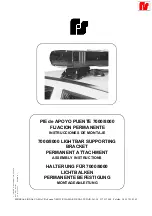
A child who can sit up without
support, and who fits within the child
seat maker’s weight and height
limits, should be restrained in a
forward-facing, upright child seat.
Of the different seats available, we
recommend those that have a five-
point harness system as shown.
We also recommend that a small
child stay in the child seat as long as
possible, until the child reaches the
weight or height limit for the seat.
In this car, the best place to install a
forward-facing child seat is in one of
the seating positions in the back seat.
If the vehicle seat is
too far forward, or the child’s head is
thrown forward during a collision, an
inflating front airbag can strike the
child with enough force to cause
very serious or fatal injuries. If a
small child must be closely watched,
we recommend that another adult sit
in the back seat with the child.
If it is necessary to put a forward-
facing child seat in the front, move
the vehicle seat as far to the rear as
possible, be sure the child seat is
firmly secured to the car, and the
child is properly strapped in the seat.
Protecting Small Children
Child Seat Type
Child Seat Placement
Placing a f orward-f acing child seat in
the f ront seat of a vehicle equipped
with a passenger’s f ront airbag can
be hazardous.
Protecting Children
Driver and Passenger Saf ety
34
Improperly placing a forward-
facing child seat in the front
seat can result in serious injury
or death if the front airbags
inflate.
If you must place a forward-
facing child seat in front, move
the vehicle seat as far back as
possible and properly restrain
the child.
















































